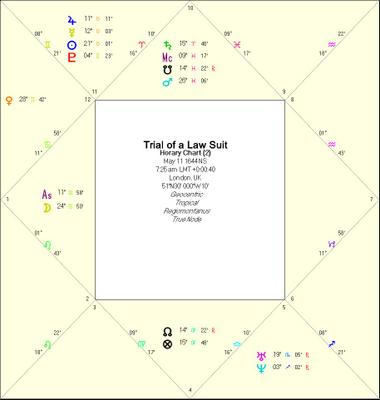Weekly Horary: The Tryall of a Law Suit

TO SEE A BIGGER VERSION OF THE ABOVE CHART, CLICK ON IT TWICE.
This is the first week's chart, taken from Lilly's England's Propheticall Merline, Foretelling to all Nations of Europe untill 1663 the Actions depending upon the influence of the Conjunction of Saturn and Jupiter, 1641. Yes, the title is that long. By way of background, it's a neat little booklet, where Lilly shows off his natal, horary and mundane skills in various charts.
First, here's Lilly's take on the chart, in his own words, more or less:
The Moon in Cancer is for the Querent, being Lady of the Ascendant: Saturn, Lord of the seventh is for the Adversary.
The problem with the interpretation above, though it is astrologically correct, is that it is not entirely logically correct. In the adversarial trial system in the US as in England, it ultimately does not matter who has the better case (shown by the strength of the significators as Lilly does), but rather whom the judge favors.
Jupiter Lord of the 10. house is Significator of the Judge, with whom Mars hath participation, because placed in the 10.
The Question is easily judged, for according to the strength of the Significators the judgment is determined: If the Lord of the Ascendant be stronger than the Lord of 7. the Querent shall overcome, and to the contrary.
Of this opinion is Guido Bonatus, sol. 273. Ille cujus significator est fortior, debebit obtinere; fortiorerit qui est in angulo maxime in aliqua suarum domorum, viz.
He whose significator is most strong, ought to obtain the better, and he is best dignified that is in an Angle, and in any of his own houses:
Being in this figure the Moon to be in her own house and in the Ascendant, in trine to Mars in the 10. and in Sextile dexter with the Sun, Lord of the second, and part of fortune with the dragons head: I judged the Querent should overcome his enemy, and so he did, Cauda draconis in the 10th.
I said that the judge at the tryall would be angry, and so he was, for the adversaries witnesses knew not what to swear, you see the quesited his significator peregrine, and in his fall; yet in accidentall dignities, prettily fortified, but wanting essentiall, it nothing availeth; whereas the Moon is essentially strong, increasing in light, number and motion.
The Querent was a sanguine complexion Gentleman, of a generous Martiall disposition, big-bon'd, strong, and very discrete.
The defendant was lean and thin bodied, hollow cheekes, sad brown hair, bending forwrd, malitious, willfull, and neither better or worse than a true Saturnine man.
If two go to fight, or to make war, the question is thus resolvedfor the most part, but you are to consider in war, the second house, and the Planets therein, signifie the friends and assistance the Querent shall have on his side; the 8th house, and the Planets therein posited, shew the same for the enemy.
Now if it happen that the Lord of the 2d is Peregrine, weak or unfortunate so shall the friends of the querent be, viz. men that promise much, but not able to performe any thing: if the Lord of the second, out of the 6. 8 or 12th Aspect the Lord of the Ascendant with square or opposition, the Querent shall have no ayde come to him, though he be promised some; and moreover it may be doubted, he or they that promise assistance, will betray the Querent, and yet seeme to be willing to help him, but will in fine do nothing; and this is more certain, if the Lord of the second have any benigne Aspect to, or with the Lord of the 7th, then they wish better to the Enemy than the Querent.
And this, to the everlasting dishonour of some in the world was in August 1644 verified: when the noble Essex was worsted, in not having timely assistance, which I foresaw by the houre of his going out, being exactly taken for me: he that could never be beaten by an Army or Armies of men, was foiled by plaine treachery, under pretence of I know not what parsimony: if men forebear to speak of this, the stones of every street will be transformed into Cryers, and cry aloud for vengeance against the perfidious.
Here, the judge is Jupiter as ruler of the 10th. It is in Taurus in the 11th house, so in Venus's sign and triplicity. It also exalts the Moon. This judge really, really likes our Querent, who, let's be honest, sounds like bit of a stud muffin. Jupiter is not in any dignities of Saturn, the opponent, so just from this information, we can be pretty sure that our Querent will win.
You want more, eh? All right. What does the opponent want? Well, as Saturn is in strong Sun dignities (exaltation and triplicity), and the Sun rules the Querent's 2nd house of money, it's simple - the opponent wants the Querent's cash. Whom does the money like? The Sun exalts the Moon (Querent), and the Moon recently aspected the Sun. So most likely, the Querent will get the money at issue in the suit, because his money wants to be with him.
So, there you have it. If you're wondering what Lilly was talking about, or how to read his sometimes mystifying prose, see this post (click here).
This article and this retype of Lilly's judgment is (c) 2005 Gryphon Astrology.


0 Comments:
Post a Comment
<< Home